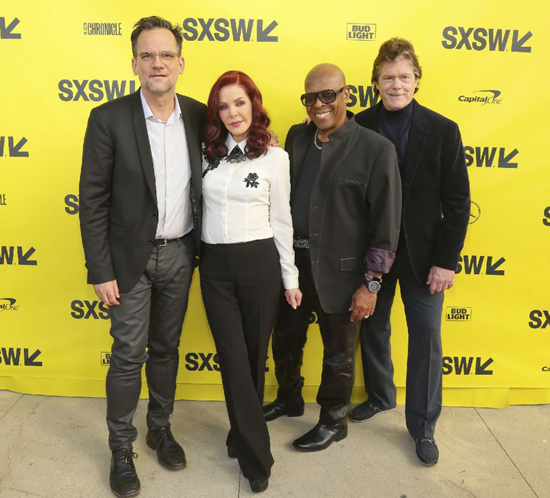
L-R: Thom Zimny, Priscilla Presley, David Porter and Jerry Schilling - Austin, TX, 3/14/18
The world premiere of Elvis Presley: The Searcher took place last week in Austin, TX as part of the 2018 SXSW Film Festival. Director Thom Zimny's two-part film, running a total of 3 hours and 15 minutes, will make its television debut next month on HBO.
The film's premiere was accompanied by a panel discussion featuring Zimny, Priscilla Presley, and legendary Memphis-based soul music producer/songwriter David Porter. The discussion was moderated by John Jackson, frequent Jayhawks collaborator and senior vice-president of A&R at Sony Music/Legacy Recordings. Jackson, Porter and Presley are among the principal figures who were interviewed for the documentary. Jon Landau, one of the film's producers, also was interviewed for the film and scheduled to be part of the panel, but was unable to attend due to Winter Storm Skylar.
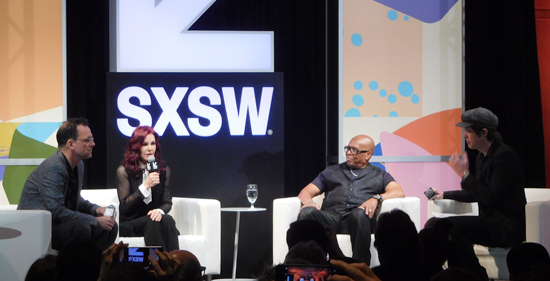
L-R: Thom Zimny, Priscilla Presley, David Porter and John Jackson - photograph by Shawn Poole
Priscilla Presley, Elvis' former wife, and Jerry Schilling, his longtime friend and former "Memphis Mafia" inner-circle associate, had been shopping around the idea of a new kind of Elvis Presley documentary for several years before they brought the concept to HBO. The network, having already aired Thom Zimny's Bruce Springsteen documentary The Promise: The Making of Darkness on the Edge of Town, recommended Zimny and The Promise executive producer Jon Landau as ideal collaborators for the Presley project.
The title of the film, as well as its focus, stem from one of Priscilla Presley's comments on her ex-husband's artistry in the interview she recorded for the film. Her comment serves as the first words spoken onscreen: "Elvis was a searcher. It's a part of him that never left."
During the panel discussion, Thom Zimny expanded upon how connecting with Priscilla Presley and Jerry Schilling helped to keep his film grounded in Elvis' consistent efforts to connect musically from the beginning of his career to its tragic end. Zimny had extensive access to Presley's private and public recordings, films and television appearances (including concert material — some previously unreleased — and rarely-to-never-before-seen artifacts provided by studios, fans and collectors). He also interviewed many who were close to Presley, those who worked closely with him and some (in the case of musicians like Bruce Springsteen) who were deeply inspired by his music.
"I realized," said Zimny, "that we were going to be able to touch upon some of the tragic moments — not dwell on the details of them, because I feel other films have explored that dialogue [already] — and also give the feeling that was coming through the music. Which is that he still was connected — he still was trying. There's sadness there, but there's also still this beauty."
Another unique aspect of Elvis Presley: The Searcher is its deep exploration of Presley's conscious efforts to combine Southern country and gospel music with the Black culture — particularly Black gospel and rhythm & blues — that he loved and studied so intently. For the SXSW panel, David Porter spoke knowledgeably and extensively on this important aspect of Presley's artistic accomplishments: "[Elvis] was just a rarity in the respect that he not only was interested in [Black musical culture], he was passionate about it. He wanted to get to the core of what shaped this emotional connectivity that came through Black artistry, and he wanted it so badly that he would dedicate himself to just studying it in a passionate way, and he got it.... You would have to go the source to get it, so he would go the Black clubs, he would go the church…. He developed an even stronger understanding of what it meant, and that gave him, in my opinion, the kind of uniqueness that separated him. It was not a common thing, and that's why he stood out as an artist."
After the panel, Backstreets was able to arrange exclusive interviews with Thom Zimny, HBO's Kary Antholis, Priscilla Presley, and Jerry Schilling. Read below what they told us about Elvis Presley: The Searcher and some interesting Presley/Springsteen connections.
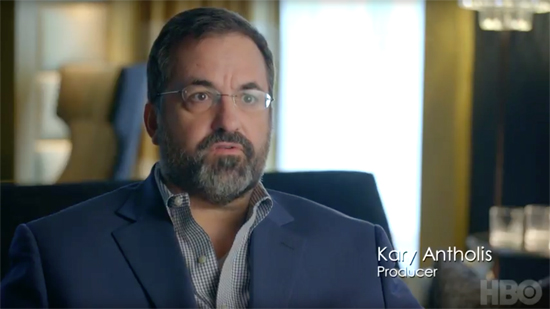
Kary Antholis - Along with Jon Landau and Thom Zimny, Kary Antholis is one of the producers of Elvis Presley: The Searcher, currently President of HBO Miniseries and Cinemax Programming at HBO. When Priscilla Presley and Jerry Schilling came to HBO to pitch their concept of a new kind of Elvis documentary, then-HBO President Michael Lombardo asked Antholis to sit in on the meeting. As part of their pitch, Presley and Schilling presented a compilation of Elvis footage representing the kind of archival material that could be included in the documentary they envisioned.
"I watched it," Antholis told us, including the "footage that I later learned came from the film Elvis: That's The Way It Is, which is the film about his return to performing live at the International Hotel in Las Vegas. That footage had Elvis in a recording/rehearsal studio as well as in a ballroom rehearsing with the band, and I was immediately struck by the similarity of the way Elvis worked with the band to how Bruce Springsteen worked with his band, particularly in The Promise, Jon Landau and Thom Zimny's film. Jon and Thom have a cinematic understanding of how to present a musical artist at work.
"Thom and I had a dinner with Jerry and Priscilla, and talked about a ton of things — Thom's work with Bruce, Priscilla's and Jerry's sense of Elvis as an artist. The next day, we went over to Warner Brothers, which had in its vault a lot of outtakes from the films Elvis: That's The Way It Is and Elvis On Tour, and we saw about an hour's worth of footage that nobody had ever seen before, including the performances of 'Burning Love' and 'Separate Ways' that are in the film. I still get shivers thinking about sitting next to Priscilla as she watched that footage for the first time. It was just mind-blowing, and we came out of that 24 hours together with a shared sense that we could make a film about Elvis, the artist, and present him in a way that he had never been presented before on film."
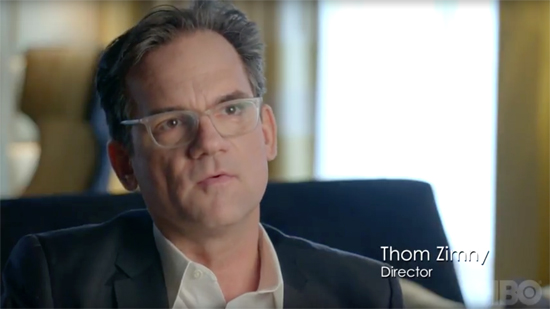
Thom Zimny - Elvis Presley: The Searcher is Zimny's first music documentary to feature a credited onscreen writer: music journalist Alan Light, who's also among those interviewed in the film.
"I always enjoyed Alan's writing," Zimny told us. "We quickly connected, and he helped a lot in the initial stages of discussing the narrative of Elvis, and also just doing the research with me." The process helped immensely in preparing Zimny for his interviews with people like Scotty Moore, Priscilla Presley and Jerry Schilling, who had such close personal relationships with Elvis. "I had a sense of what was already covered and some of the things in which I was interested in going deeper. So along with [esteemed Elvis archivist and researcher] Ernst Jørgensen and Alan Light, I did a couple of months of research that pored over the details of Elvis' recording sessions, his movies, the scope of his career... and with that, worked with Alan on the [interview] questions."
The decision was made early on to present material from all of the modern-day interviews conducted for the film in "audio-only" format, so the audience will hear the voices of interviewees but never see them onscreen (though onscreen captions are used to identify the voice of each interviewee).
Speaking like the skilled editor he is and was before he started directing, Zimny said, "For me, as a director, the film is always found in the cutting room. You find the film in the editing room, and with Elvis it was no different. The beauty of it this time was that there was no 'talking head.' So I was able to work with archival material and stills in a different way, where I tried to create this dream landscape of being in Elvis's mind or his world as much as possible. I wanted the film to feel like it was this tale unfolding, that occasionally Elvis would comment on. After a lot of people discussed many different things, Elvis himself would come and discuss ideas of his career or music, or anything that just gave you a deeper understanding of the man and a chance to hear the magic and beauty of his voice. So I knew if we were cutting to someone sitting in a chair, I'd be taking you out of that dream of the film. It also pushed me in the direction of shooting, as a director, these atmospherics of Graceland, making Graceland itself a character in the movie.
"I worked with visual metaphors of things I got obsessed with; one of the early things was the bike. The bike in the film is an image of Elvis's childhood life. While taking a tour of Graceland, I saw a rusted bike in a little garage. I then saw a photo of Elvis as a child with that kind of bike, and realized that there's a very good chance that it's the same bike. I thought about the importance of that bike, and also his life: how many things he'd lost, but he held on to this bike.
"So that became a visual metaphor for the film and also became a metaphor for the searcher himself — Elvis — because he would go on his bike, go around town, go to the churches, go to the different clubs and explore. All of that comes together in the cutting room — many times unconsciously, but you try to stay in that dream space and try to tell a story that feels fresh, but also educates a generation in some ways about the beauty and music of this man."
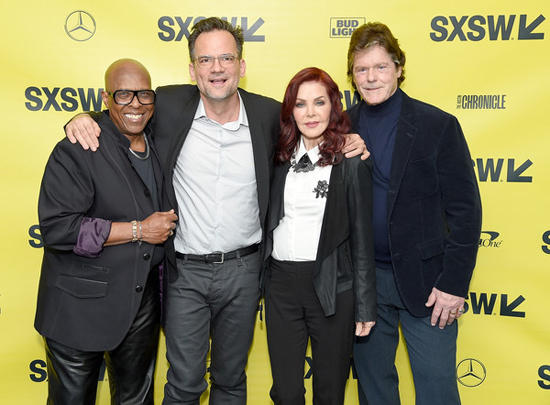
Zimny went on to express his deep appreciation for Priscilla Presley's involvement with Elvis Presley: The Searcher. "One of the most important things for me as a filmmaker was that Priscilla Presley gave me access to both Graceland and the Presley archive. More important, she told me an amazing amount of detail on Elvis and spent many, many, many hours with me, talking. I would not have a film without Priscilla. Priscilla's and Jerry Schilling's dialogue in the film is essential in telling the story.
"Marc Cimino at Universal Music called me up, and I was talking to him about the Elvis project. He brought forward these two ideas: 'Meet Mike McCready from Pearl Jam [who went on to score Elvis Presley: The Searcher],' and also, 'You have to get Tom Petty.' Marc was really insistent:'You've gotta get Tom Petty, because Tom knows the music front to back and is not only a fan but can speak [from experience] to the journey of Elvis' development as a musician.'"
"Mike McCready had this daunting task: how do you score a film next to Elvis Presley music? I went to his home studio in Seattle, and Mike would come up with some amazing ideas. We'd discuss what was going on with Elvis's life and, very similar to Bruce, Mike has that focus and dedication to getting the sound... the sonic landscape that is needed for the movie. And like Bruce, he chases it; he doesn't stop until it's there. I think Mike's amazing, and I want to do every film with him. He was great."
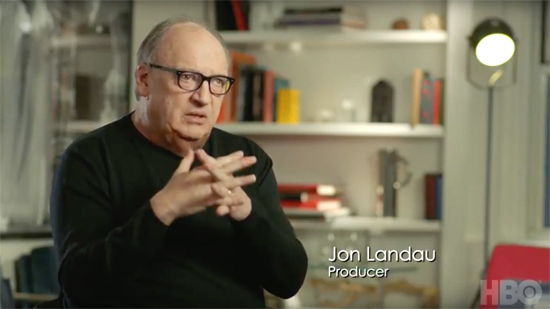
Zimny also related to us how crucial it was to have Jon Landau and Bruce Springsteen involved in this project. "With the Elvis story, Jon Landau was especially important in his influence on how we would approach the film from early on, because we wanted it to be about the music and step away from the 'cartoon' of Elvis. The cartoon presentation of Elvis over the last twenty years has just been focused on the darker side of his life, and the music got lost. One of the key things that Jon and I discussed in the early days of this project was, 'Let's bring back Elvis the artist and let's make the film's focus about the music.'
"I think Jon's knowledge of film and music is amazing to be around, and I feel really comfortable collaborating with him because we're able to get into a dialogue that gives you a lot of space to try things. He's very respectful of that process. He gets it, and he comes from a space of being a writer and editor. He was a film critic, too, and his knowledge of film is astounding. In his own gentle way, he's a great influence and will draw upon art, photography, music and his vast knowledge of those things to bring to a project. I'm really happy that Jon and I had another adventure in film. It was very different than the experience of working with the Bruce narratives, but at the same time we kept the focus very similar; it was about the music."
"For this film, I wanted everyone talking about Elvis to be people who really believed in Elvis and had their lives changed by him. When you look at people like Tom Petty and Bruce Springsteen, you know as kids they had this life-changing moment listening to Elvis Presley. You can feel it in their voices, you can feel it in their descriptions of the music, and you can see it in their rock 'n' roll lives. So I wanted to make sure that no one was in the film who was there for the sake of celebrity. You had to believe in Elvis, you had to know the music, and you had to seem like you were never the same after you saw him. That was the criteria. And there was a lot of people I could've reached out to, but I felt that these people really reflected the tone, passion and commitment that we wanted to get across with Elvis.
"My conversations with Bruce were great because Bruce is a big Elvis fan, as I've known for years, and he gave me a great interview where I was able to discuss with him first watching the '68 Comeback special in his living room, his memories of the power of Elvis and his love of the music. I was really grateful to have that time with him, and he just gave me so much."
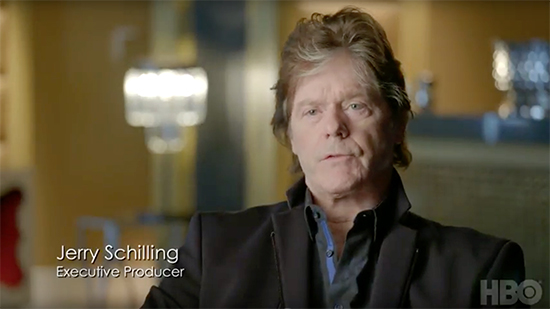
Jerry Schilling - During the making of Elvis Presley: The Searcher, some time before Springsteen had recorded his interview for the film, Jerry Schilling decided to check out the audiobook version of Springsteen's autobiography Born to Run. Schilling was eager to tell us that he believes Bruce's book contains "the best description of Elvis Presley that I have ever heard. It is a beautiful description of his body of work — who he was, where he came from — that only another artist would understand. It even had a certain element of what was not perfect about Elvis, which made the whole thing beautiful. It's the best description I have ever seen or heard of Elvis Presley."
In the mid-1970s, Jerry Schilling became Billy Joel's tour manager; it was Joel, he told us, who first turned Schilling on to the music of Bruce Springsteen. And in the late 1960s, Schilling began pursuing a career in film editing (Schilling served as an assistant editor and post-production assistant for the 1972 documentary Elvis On Tour, some footage from which was incorporated into Elvis Presley: The Searcher), which helped him to connect so well with Zimny on this project.
"We had a great meeting of minds. Of course, Thom is much more in tune with [editing] than I am. I have a nice overview, but... little things that Thom would put in the middle of something… the research... stuff that Priscilla and I hadn't even seen before. We're just very, very pleased, and it's an honor to be on a project with Bruce Springsteen's name and voice, and Jon Landau. It's truly an honor. And Tom Petty was beautiful in his involvement. Thom put together just a great team; it became a family."
Of course, we had to ask Schilling, who was so close to Elvis, the question that continues to intrigue many fans of both Springsteen and Presley. In the context of Elvis Presley: The Searcher, we were discussing those "third-generation" rockers who were inspired by Elvis, like interviewees Tom Petty and Bruce Springsteen. During Elvis's final years, Petty and Springsteen still were young artists just beginning to establish their national and international reputations. We asked Jerry Schilling, however, if he could tell us whether Elvis knew of either of these musicians and at least a bit of their work before he passed. His brief reply: "He did of Bruce."
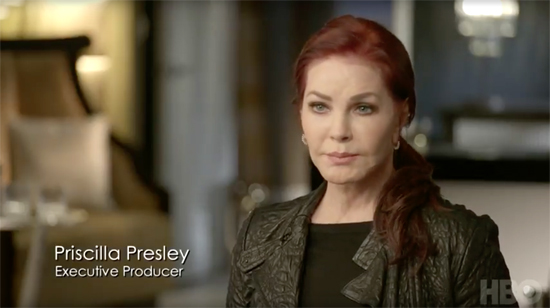
Priscilla Presley - Priscilla Presley can neither confirm nor deny Jerry Schilling's claim that Elvis Presley was aware of young Bruce Springsteen, but she wouldn't be surprised if it's true. She also would have loved for Bruce and Elvis to have met, because she knows that Elvis would've enjoyed talking with Bruce. "Elvis knew about and loved all kinds of music," she told us, "and he loved talking to musicians. After his Vegas shows, if there was anyone else performing in town — like Tom Jones, Shirley Bassey, The Righteous Brothers — he would invite them to his suite, sit down for hours and talk with them. They would connect as artists, whether it be what songs they liked, getting nervous onstage.... He just loved to talk music."
Presley also wanted us to know how deeply she appreciates a particular comment made by Bruce Springsteen in Elvis Presley: The Searcher, a portion of which also appears in the film's trailer: "An artist like Elvis... he's actually pretending when he's home to be normal, and when he goes out onstage at night, it's who he actually is."
"That comment meant so much to me," she told us, "coming from an artist who can understand so many of the issues that Elvis had to face. It was very moving for me to hear it, especially being the person often 'at home' while Elvis went off to work. Next week, while we're in New York, Jerry and I plan to see Springsteen On Broadway. I can't wait to see Bruce and thank him personally for his involvement in this film."
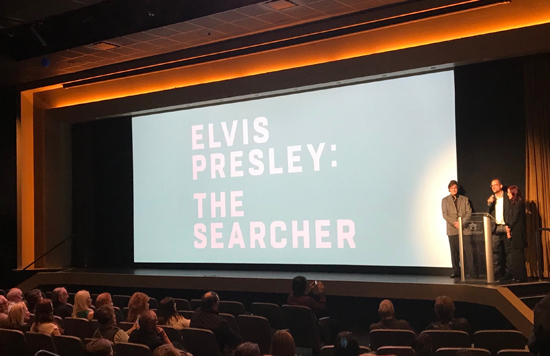
Jerry Schilling, Thom Zimny and Priscilla Presley at the March 17 Graceland preview screening of Elvis Presley: The Searcher - photograph by Kary Antholis
Elvis Presley: The Searcher will make its television debut on HBO at 8 pm ET on Saturday, April 14. It will become available on HBO GO, HBO NOW and On Demand that same weekend. Click here to watch a just-released "Inside Look" video featuring Thom Zimny, Jon Landau, David Porter, Priscilla Presley, Jerry Schilling and Kary Antholis.
- March 20, 2018 - Shawn Poole reporting






